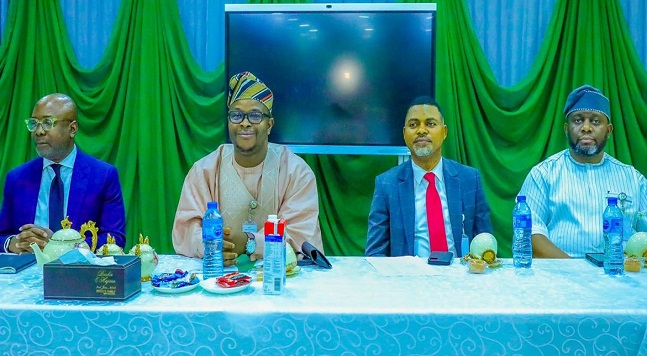Telecom
NCC Moves to Develop Regulatory Framework for 5G, HAPS Technologies

Stakeholders in the telecommunications sector on Tuesday in Abuja held a one-day stakeholders forum to brainstorm on Nigeria’s readiness for 5G and High Altitude Platform Station (HAPS) technology.
The forum was organised by the Nigerian Communications Commission (NCC),
In his presentation, Prof. Umar Danbatta, the Executive-Vice Chairman NCC said the forum was to bring stakeholders in the telecom sector together to develop a regulatory framework in preparation for 5G and HAPS technologies.
Danbatta was represented by Mr Austine Nwaulune, Director, Spectrum Administration, NCC.
According to him, though the 5G framework is still being defined by the International Telecommunication Union (ITU), there is the need to prepare toward massive deployment of infrastructure tailored to support the technology.
He said the commission had identified some potential frequency bands that might be harmonised for 5G deployment, and therefore suspended the licensing of those frequencies.
Danbatta stressed that this step would ensure that Nigeria was not caught unawares when those frequency bands were harmonised by standardisation bodies, key among these are 26GHz, 38GHz and 42 GHz bands.
“HAPS is one of the emerging technologies developed to compliment capacity expansion efforts to improve broadband access to both served and underserved areas.
“The technology is unique and promising, it is scalable and customisable, and therefore often equipped with mission-dependent payloads, which are intended to act as fixed stations, delivering services such as high-capacity wide area coverage broadband.
“Relay stations, remote sensing, weather observations, navigation, digital TV, within the earth atmosphere, HAPS are also known to be low cost at its implementation and are expected to be the next big infrastructure for wireless communications.’’
He said that it supports rapid roll-out and had the ability to serve many users, using considerably less communications infrastructure being its key advantage as a wireless communication platform.
Danbatta said there was therefore the need for strategic government policies, robust frameworks and required infrastructure which was the reason for the forum. In his capacity,
Nwaulune said the technological evolution toward 5G and the role of HAPS to increase broadband penetration in Nigeria 5G networks are the next generation of connectivity in the telecommunications industry.
“What we are doing is to bring together stakeholders, people who are involved in one way or the other in 5G technology delivery and the regulatory conditions to discuss with them, rub minds and to guide us in taking further regulatory actions.
“There is progression, 5G is not about today, there are still trial networks going on around the world, this is just to position people to know that there is something coming in the very near future.
“All the technology mixes are used in bridging the digital divide and bringing service to the unconnected and some marginally connected.
“It is the operators that deploy the networks once the standards are set and defined, the operators will roll out their networks that is when it is fully developed.’’ Nwaulune said.
Mr Austine Igbe, who represented the President, Nigerian Institute of Information Communication Technology Engineers, said the cost of not embracing technology was higher than the cost of ignoring it. He added that the nation must be critical of the health and safety implication of the current trends, and must prepare to make regulations that would protect the citizenry from negative impacts.
The forum had in attendance a cross section of ICT professionals and engineers both within and outside Nigeria.
Telecom
GSMA Launches Innovation Fund to Accelerate Green Transition Through Mobile Technology

The GSMA yesterday announced the global launch of a new Innovation Fund offering grants of £100,000 to £200,000 to support small and growing enterprises using mobile and digital technologies to accelerate the green transition in low- and middle-income countries (LMICs).

The GSMA Innovation Fund for Green Transition for Mobile (the Innovation Fund), a GSMA-funded initiative supported by its members, builds on the GSMA’s commitment to advance inclusive and sustainable connectivity, and the mobile industry’s ambition to achieve net zero emissions.
The Innovation Fund will support commercially viable innovations that expand access to clean energy and promote circularity in mobile devices – including renewable energy solutions, smart metering, refurbishment models and responsible e-waste management – to advance digital inclusion and industry climate action.
The initiative aligns with the United Nations Sustainable Development Goals, recognising the critical role of mobile technology in enabling inclusive, sustainable development.
Targeting enterprises operating across Africa, Central and South America, and South and Southeast Asia, the Innovation Fund will focus on solutions that strengthen digital inclusion, affordability and socio-economic empowerment, while delivering environmental impact.
Philippe Bellordre, Acting Head of Mobile for Development, GSMA, said: “Through this Innovation Fund, we are investing directly in enterprises that are using mobile and digital technology to advance digital inclusion and enable a clean energy transition – while also scaling practical, circular solutions that extend the life of mobile devices and make connectivity more affordable for underserved communities.”
Driving circularity and improving handset affordability
Another core focus for the Innovation Fund is extending the lifespan of mobile devices through circular economy approaches, including repair, refurbishment and reuse, reducing e-waste while increasing access to affordable handsets for underserved populations.
The Innovation Fund will support solutions such as take-back and trade-in schemes, leasing models, refurbished device marketplaces, traceability tools, and responsible e-waste collection and recycling. By keeping devices in circulation for longer, these initiatives lower environmental impact while reducing the cost of ownership and expanding connectivity for low-income communities.
Building evidence for industry climate action
Beyond supporting individual enterprises, the Innovation Fund is designed to generate practical insights and lessons that contribute to the mobile industry’s wider climate and ESG priorities. This includes evidence that supports enabling environments for clean energy and circular economy solutions, informs policy discussions, and helps scale sustainable business models across emerging markets.
Who the Innovation Fund is for:
The Innovation Fund is open to for-profit small and growing enterprises with up to 250 employees that are:
- Operating in LMICs across Africa, Central and South America, or South and Southeast Asia
- Using mobile or digital technology as a core part of their solution
- Demonstrating commercial revenue and active users
- Able to contribute at least 25% matching funding
What the Innovation Fund provides:
Selected enterprises will receive:
- Grants of £100,000 to £200,000 over 15-18 months
- Technical assistance
- Support to connect with investors and build partnerships with mobile network operators
- Monitoring, evaluation and learning support
- Visibility through GSMA platforms, publications and industry engagement
Telecom
Prof. Adeyanju is Strengthening Nigeria’s Digital Backbone for a Connected Future in Two Years of Purposeful Leadership

Two years ago, the President of the Federal Republic of Nigeria, Asiwaju Bola Ahmed Tinubu (GCFR), appointed a new Executive Management Team at Galaxy Backbone Limited (GBB) and this marked a defining moment in Nigeria’s digital evolution.

Today, as the organisation marks the second anniversary of the appointment of four distinguished Nigerians; Prof. Ibrahim A. Adeyanju, as Managing Director/Chief Executive Officer, Honourable Olusegun Olulade, Executive Director Customer Centricity and Marketing, Muhammed Sani Ibrahim; Executive Director, Finance and Corporate Services and Olumbe Akinkugbe, Executive Director, Digital Exploration and Technical Services to Galaxy Backbone Limited, the story is not one of rhetoric, but of infrastructure strengthened, partnerships deepened, and national capability measurably advanced.
From the onset, the mandate was clear: to anchor Nigeria’s digital transformation on secure, sovereign infrastructure while improving service delivery across Ministries, Departments, and Agencies.
The Executive team immediately aligned execution with strategy through the launch of the Integrated Digital Transformation Strategy (IDTS) 2023 to 2028. The focus evolved from simply providing connectivity to leading a digital ecosystem that integrates infrastructure, platforms, policy alignment, value creation, and people.
Within two years, Galaxy Backbone significantly expanded national digital access. Broadband connectivity was delivered to nine underserved Local Government Areas under Project 774, extending inclusion to communities previously beyond reliable access.
Fibre-to-Hostel projects were completed at the University of Lagos, University of Abuja, and University of Jos, strengthening academic research and digital learning environments. Connectivity to strategic national assets, including the Nnamdi Azikiwe International Airport and key Federal Secretariats, was enhanced to improve operational efficiency and service reliability.
In a major step toward long-term resilience, GBB executed strategic business partnership with one of Africa’s leading provider of inter-connected carrier scale digital Infrastructure Companies, West Indian Ocean Cable Company (WIOCC), reinforcing Nigeria’s national fibre backbone, improving redundancy, and enabling scalable broadband expansion across more states and underserved communities.
This strategic move significantly strengthened the country’s digital resilience architecture.
Beyond infrastructure expansion, the leadership deepened Nigeria’s sovereign digital capabilities. The 1Government Cloud platform was optimized and expanded to support more MDAs with operational efficiency, secure hosting and shared services.
GovMail, a locally developed email solution by GBB, for Federal Government Public and Civil Servants was birthed and today is enhancing trusted government communication for over 100,000 professionals currently on the platform. Cybersecurity posture was reinforced through 24/7 monitoring and strengthened controls, while colocation services and data centre operations were upgraded for greater resilience. Under this leadership, GBB’s Service desk now operates 24/7, 365 days a year.
The deployment of Government as a Platform (GaaP) framework, improvements to the Government Service Portal, ISO recertification milestones and the implementation of an Integrated Management System (IMS) further institutionalized governance, accountability, and operational excellence.
The journey has not been without challenges. Fiscal constraints, legacy systems, increasing cyber threats, and rising expectations for digital public services required decisive leadership.
Through disciplined financial management, strategic partnerships, stronger stakeholder engagement, and operational reforms, the Executive Management stabilised systems, improved service quality, and positioned Galaxy Backbone as a trusted enabler of public sector transformation.
Support from the Honourable Minister of Communications, Innovation and Digital Economy, Dr. Bosun Tijani, the Secretary to the Government of the Federation, Senator Dr. George Akume who chairs the GBB Board, and the Head of the Civil Service of the Federation, Mrs. Didi Esther Walson Jack and other top Government leaders across the arms of Government, have all been instrumental in aligning policy direction with execution momentum, ensuring that national priorities translate into tangible digital outcomes.
Over the past two years, Galaxy Backbone has earned over 20 reputable recognitions, including the NET5.5G Pioneer Award, the inaugural Artificial Intelligence Award, the Overall Winner award at the Nigeria @ 65 Independence Kitty, the BPSR Website Performance Award, and Best ICT Provider Company of the Year at the International Standard Excellence Awards and so on. GBB’s MD/CEO, Prof. Adeyanju has also been named as one of the top 100 leading Personalities in the Telecoms Industry in Nigeria.
These honours reflect not just institutional visibility, but measurable transformation in governance standards, infrastructure resilience, and service delivery impact.
Two years on, Galaxy Backbone stands stronger — not merely as an infrastructure provider, but as a strategic custodian of Nigeria’s sovereign digital backbone.
With clarity of vision, disciplined execution, and sustained collaboration across government, the organisation continues to deepen connectivity, strengthen cybersecurity, expand cloud sovereignty, and build a resilient digital foundation for national development.
The progress achieved affirms a simple truth: purposeful leadership, aligned with national vision and supported by strategic partnerships, can translate ambition into enduring capability. Galaxy Backbone remains committed to powering a secure, connected, and digitally enabled Nigeria for generations to come.
Telecom
Moniepoint Case Study Reveals Digital Payments Fuel Nigeria’s Vibrant Community Nightlife Economy

Moniepoint Inc., Africa’s leading all-in-one financial ecosystem, has released a new case study titled “The Business of Community Nightlife in Nigeria,” providing a rare, data-driven look into the country’s informal night economy.

Moniepoint
While high-end “Detty December” venues grab headlines with daily revenues of ₦360million and table prices reaching ₦1.2million, Moniepoint’s research shifts the spotlight to the “community nightlife” where roadside bars, suya spots, and neighborhood joints form the bedrock of social life for millions of Nigerians.
The robust study was drawn from transaction data across more than 27,000 clubs, bars, and lounges sitting on Moniepoint’s payment rails alongside fieldwork with nightlife operators and workers across the country.
Combining anonymised transaction data processed by Moniepoint with field interviews and observational research across multiple Nigerian cities, the study provides a rare, ground-level view of how money, labour, and social life intersect after dark.It is the latest in a series of sector-specific studies by the company aimed at bringing data visibility to Nigeria’s informal economy.
According to the report, in a stark contrast from wider informal economy trends, cash plays a diminishing role in nightlife payments. The report shows that bank transfers dominate, followed closely by card payments, with cash actively discouraged due to security concerns.
Moniepoint’s data shows that transfers outpace card payments by nearly 2 million transactions during peak nighttime hours across its network.
One of the study’s most operationally significant findings concerns the timing of spending. Nightlife in Nigeria runs long but economically, the night is decided early.
Transaction volumes begin climbing sharply from 8pm, peak before midnight, and then decline steadily even as venues remain full. By the time the night is at its longest, purchasing activity has already wound down.
However, for bar operators, this has clear practical implications – the most critical hours for staffing, stocking, vendor payment and cash flow management are the earliest hours of the day between midnight and 6am.
The report further underscores the sector’s role in employment, noting that local bars typically expand their workforce by 30-50% on peak nights. Conservative estimates suggest at least 54,000 people are engaged in nightlife labor every night across Nigeria.
“Nigeria’s local bars and night-time operators are not peripheral to the economy, they are a critical part of its architecture.
We see a substantial and sustained economic sector that employs hundreds of thousands of Nigerians every night and deserves the same attention we give to agriculture, healthcare, and retail. Our goal is to make sure every one of those businesses has the tools to grow.
From giving credit to finance renovations and sound systems to providing same-day settlement that allows vendors to restock and with tools like Moniebook that power inventory management and reconciliation, Moniepoint is ensuring that this vital artery of the nation’s economy remains viable and empowering,” said Tosin Eniolorunda, Co-Founder and Group CEO, Moniepoint Inc.
Other key interesting findings include:
The most common transaction narrations from the data sourced – “food”, “pay”, “sent”, “pos”, “cash” – reflect the full breadth of nightlife spending: street food, club entry, lounge tabs, transport, and afterparties. Digital payments have gained huge traction in Nigeria’s social space.
While alcohol remains a key revenue driver, the data shows that food is the quiet stabiliser of Nigeria’s night economy, particularly in local and informal settings. In several neighbourhood venues, bottled water and meals outsell beer and spirits, especially early in the evening.
Lagos leads in sheer concentration of nightlife establishments, with 4,856 bars, clubs, and lounges on the Moniepoint network. FCT follows with 2,515, then Rivers (2,362), Delta (1,930), and Edo (1,574).
Katsina leads the country in nighttime food truck payment value, with vendors pulling in over ₦130 million in the last 12 months. Kwara State leads in transaction count. Nigeria’s nightlife economy is distributed, not overly elitist.
On the lending side, the report notes that a significant share of loan requests from bar and lounge operators is directed toward renovations, furniture, lighting, and sound systems showing that investments intended to attract and retain customers in a competitive sector where ambience plays a decisive role.
Moniepoint continues to fuel this sector through innovative features like “POS Transfers” and by assigning a dedicated bank account to each terminal, the system provides an instant “audio-visual” confirmation, a signature “ping”, that allows service to continue without the friction of waiting for SMS alerts or verifying screenshots.
Furthermore, in addressing the unique safety needs of consumers, Moniepoint cards are designed without visible card numbers, expiry dates, or CVVs, ensuring that a customer’s financial information remains secure.
As Nigeria’s largest distributor of financial services, Moniepoint’s ongoing commitment to financial inclusion and economic development has positioned it as a catalyst for growth across Nigeria and beyond.
The company processes billions in transactions monthly and continues to expand its reach, supporting millions of businesses with payments, banking, credit, and business management solutions.

 News2 days ago
News2 days agoABoICT Lecture 2026 to Focus on Impact of AI, IoT on Business Operational Efficiency

 General News2 days ago
General News2 days agoLeo Stan @ 70: Blessed and Bruised by Country, Eyes Next Disruption

 General News2 days ago
General News2 days agoZinox Technologies and TD Africa Forge Strategic Partnership to Revolutionize African Tech Ecosystem

 Telecom2 days ago
Telecom2 days agoUwaje Pays Tribute to Leo Stan Ekeh @70

 E-Financial1 day ago
E-Financial1 day ago$214Bn Missing, Institutions Silent: Is Accountability Dead in Nigeria?

 General News1 day ago
General News1 day agoNITDA, Abia Partner on Enterprise Architecture Reform

 Telecom1 day ago
Telecom1 day agoCyber Immunity Emerges as Shield for Nigerians Amid Rising Scams

 E-Business1 day ago
E-Business1 day agoInterswitch Partners Abia to Digitise Public Hospitals


























